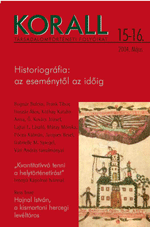Nemzeti vagy felekezeti történelem? A nemzeti történelem diskurzusa az első magyar történelem-tankönyvek Szent István-képének vizsgálatán keresztül
The Discourse of National History in the First Hungarian History Books (1777–1848). Interpretations of the Rule of (Saint) Stephen I. in Contemporary
Author(s): L. László LajtaiSubject(s): History
Published by: KORALL Társadalomtörténeti Egyesület
Keywords: social history; Hungary; identity; the idea of nation in history textbooks; textbooks and identity; Stephen I; Hungarian king
Summary/Abstract: During modern nation-building history books telling national history in the nation’s language are crucially important mediators (lieux de mémoires) for the transmission of cultural memory. Through the interpretations of the first Hungarian Christian king’s rule, the study examines the emplotment methods of the first printed and not anonymous Hungarian language history books. The narratives of authors belonging to different religious denominations clearly show the fragmentation of contemporary historical discourse along the boundaries of denominations. Denominational differences manifest themselves in all possible aspects in the consideration of the canonised ruler who had a crucial role in organizing religious infrastructure, culture and the state, and basically founded and renewed the nation and the society. While in the majority of Catholic textbooks the reader is confronted with the traditional myth of the first Hungarian Christian ruler, Protestants let him appear as pragmatic secular ruler who disrupted the nation’s organic organism by alien customs. Peculiarly, it is the only Hungarian language textbook written by an Israelite author that produces possible connecting links between the two different images of (Saint) Stephen and the nation. Anyhow, in some cases other authors break through constraints of denomination, too, and in relation to other historical periods one might positively talk about an “all-national perspective” and “the common possession of an undivided heritage” (E. Renan) considering Hungarian history books.
Journal: Korall - Társadalomtörténeti folyóirat
- Issue Year: 2004
- Issue No: 15-16
- Page Range: 205-225
- Page Count: 21
- Language: Hungarian

